Freelance Writer Websites: Do You Really Need One?
Jan 15, 2018
Post updated: October 18, 2020

Let’s talk about freelance writer websites. Mainly—do you actually need one?
Well, my friend, if you don’t think you can invest time in scrolling through this article, I’ll offer you the short answer right here (how accommodating, right?): Yes, I highly recommend that you create a website for your freelance writing business—even if it’s just a simple one.
Creating a website is a smart move for your #freelancewriting business. Here's why: Click To TweetWhy Do You Need a Freelance Writer Website?
I get it—you’re probably telling yourself all of the same things I did when I was making the futile attempt to convince myself that a website just wasn’t for me.
I’m not a web developer, I’m a writer. I have a LinkedIn profile where clients can find me. I’ll just send them samples and information if they ask for that.
Oh, yes, I’ve been there before. But, here’s the thing: As big of a pain as you might think it is to set up a website for your freelance business (I promise, it’s not nearly as hard as you’re making it out to be), it will be worth its weight in gold. Here are a few of the many, many, many reasons why:
1. Your freelance writing website matters to your clients.
I have an embarrassing confession to make: When I was just dipping my toes into the freelance waters, I used to send a resume (yes, a real resume) to potential freelance clients. I promise I’m blushing and cringing over here.
What was the big deal with that? First and foremost, it’s not the norm. Potential freelance clients don’t really care about your degree, what extracurriculars you participated in, or what your GPA was. I can count on zero fingers the number of times I’ve been asked about my formal education.
So, if they don’t care about your resume, what do they care about? Your writing samples. Yep, that’s pretty much it.
This is why a website is so helpful. It’s a place where clients can see your published work. They can also learn more about your services, your process, and even who you are as a person.
Think of it like this: If you want to learn more about a business—whether it’s a plumber you’re thinking about hiring or a new Mexican restaurant you’re planning on trying with friends—what do you do? You Google it, right?
What’s your impression if you don’t find a website or any sort of digital presence? Well, that business immediately seems fishy. You also don’t know if you can trust any of the other information you find.
Those same thoughts run through your potential clients’ brains when they search for you and nothing pops up. You need to be somewhat present online as a freelancer, and a website allows you to control what information your clients are seeing.
2. Your freelance writing website showcases your (very best) work.
Duh, right?
As opposed to a platform like Contently (which I still think is great, by the way!) that pulls all of your work from all over the web, a personal website allows you to turn the spotlight on the written work that you’re most proud of. That’s the stuff that you want to put directly in front of clients’ eyeballs.
Additionally, if you’ve landed on a niche as a freelance writer, you can use your portfolio to showcase the samples that are most relevant to your focus area and your ideal freelance clients.
3. Your freelance writing website works (even when you don’t).
I had assumed that any website I created would sit there and collect digital cobwebs. Who would stumble upon it or bother scrolling through it?
I couldn’t have been more wrong. People who find me on platforms like Twitter and LinkedIn almost always click through to my website to take a look around. Or, people will see my byline, Google my name to learn more about me, and then peruse my website.
There have been quite a few clients and gigs I’ve landed through people who have stumbled upon my freelance writing website and then reached out using my contact form.
In short, your website is always up and running—working hard on promoting you—even when you’re sleeping, on vacation, or watching “The Office” for the 14th time (guilty).
4. Your freelance writing website gives you the opportunity to publish work.
For all of you newbie freelance writers that feel discouraged by the fact that you don’t have any published samples to share with prospective clients, it’s time to create your own opportunity.
By setting up your own website, you can also establish your own blog (like the one I have right here).
This provides the perfect outlet to not only get your creative juices flowing, but also write some pieces that you can showcase if you’re short on other published work.

5 Best Practices for Effective Freelance Writer Websites
Alright, so hopefully I’ve convinced you of the many benefits of having a website for your freelance writing business. But, that likely leads you to another question: How do you create a good freelance writer website?
I’m by no means a website pro (seriously, that’s why I pay people to help me with things like that), but there are a few basic tips that you should implement.
1. Show Some Personality
Of course, clients have landed on your website to take a gander at your work. However, they’re also there to find out a little bit more about you. Humans like to work with other humans.
So, with that in mind, don’t be afraid to open up and give people more of a peek into who you are as a person.
That all starts with a solid “about” page. Melyssa Griffin has an awesome resource to help take some of the pain out of that process. As much as you want to tout your skills, experience, and accomplishments (and, you should), make sure to also include some more personal elements about who you are outside of your professional life.
There are plenty of other fun things you could incorporate—whether it’s quirky photos or even a video message.
One of my favorite aspects of my own “about” page on my website are these click-through slides where people can learn more about my family, my hobbies, and of course, my dogs.
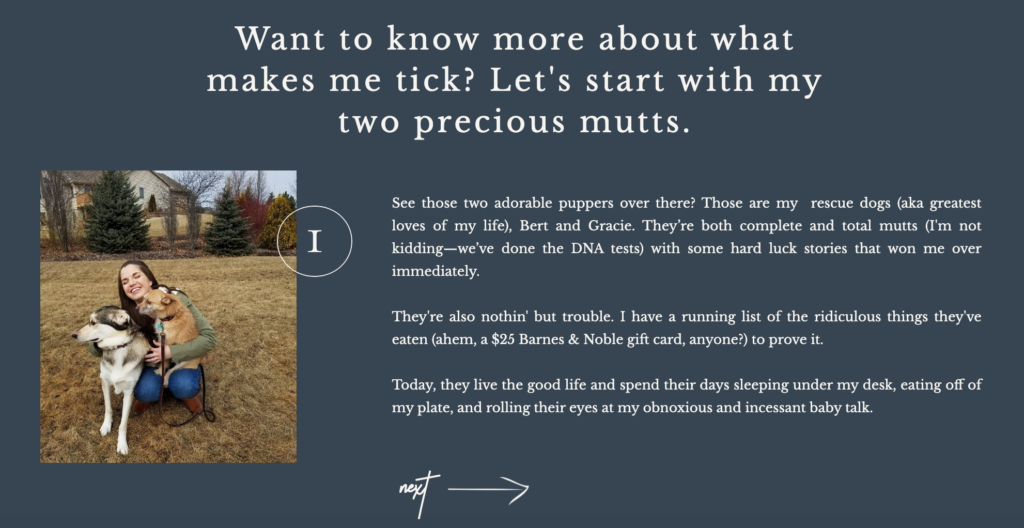
Another piece I love is this brief questionnaire that covers a few other tidbits about my interests and personality—like my love for “The Office” and tacos.
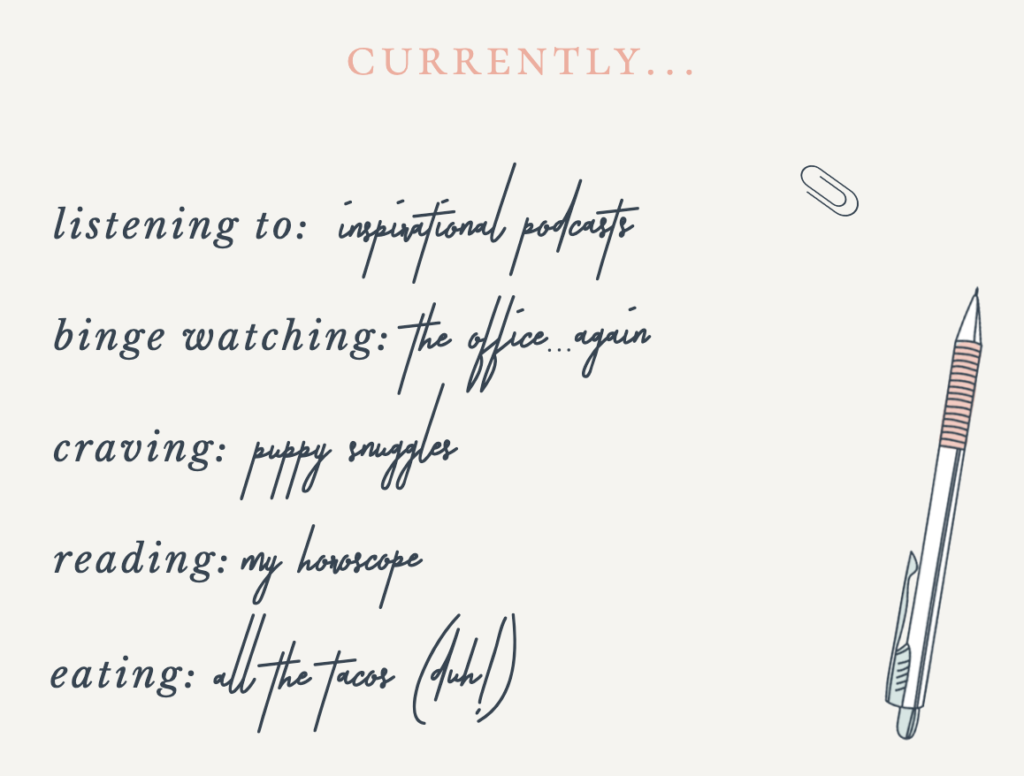
2. Highlight Your Best Work
Here’s the thing: When clients Google you to see what published work you’ve already put out there, you don’t have a ton of control over what they see first.
While I might rather have them land on my in-depth analysis of what exactly it means to find “meaning” at work, the article I wrote years and years ago about how to tell if you have toxic in-laws might just have better SEO and land at the top of their search results.
This is why it’s so important to showcase the work you’re most proud of on your website. When you direct clients to that space, you can rest assured that they’re seeing the work that you think best represents you and your capabilities.
Exactly what you choose to include there is up to you, but I recommend pulling together an assortment of pieces so that you have some variety. This doesn’t mean that they need to cover different topics (hey, most of my portfolio covers my niche: career and self-development advice), but your pieces can vary in terms of things like:
- Length: It’s great to have some short-form and some long-form.
- Complexity: Maybe one is a research-backed and interview-intensive piece while another is a lighter read or a personal essay.
- Voice: It’s smart to showcase your versatility by including some pieces that maybe have a more conversational voice while others are more formal or corporate.
- Outlet: This is tougher if you have limited samples. But, at this point, I try to include pieces from a variety of the places I’ve been published, rather than from one publication or blog.
The important thing is to take the time to sift through your samples and pull out the ones that you most want your clients to see.
If you have the option, it’s best if your portfolio functions as a hub of your published work but links out to the original pieces. Clients should click through to read through the piece in its entirety on the outlet where it’s published.
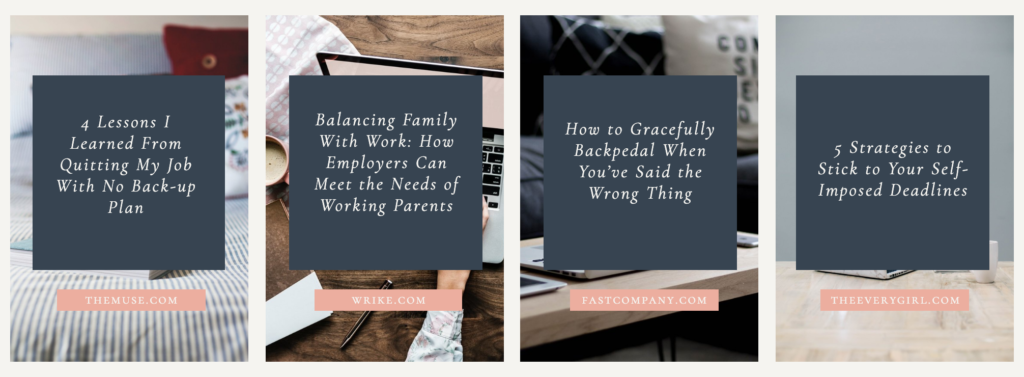
3. Make Your Contact Information Obvious
Remember how we talked about the fact that your website is always working, even when you’re not? Well, that doesn’t work out too well if you don’t make it easy to contact you.
Clients won’t spend ages figuring out how to get in touch. They’ll give up and move on with their days.
I recommend including a designated “contact” option right in the main navigation of your website so it’s blatantly obvious how interested prospects can get in touch with you. Mine appears right after my “home” and “about” page links in my navigation because I think it’s just as important (if not more important) than those pages.
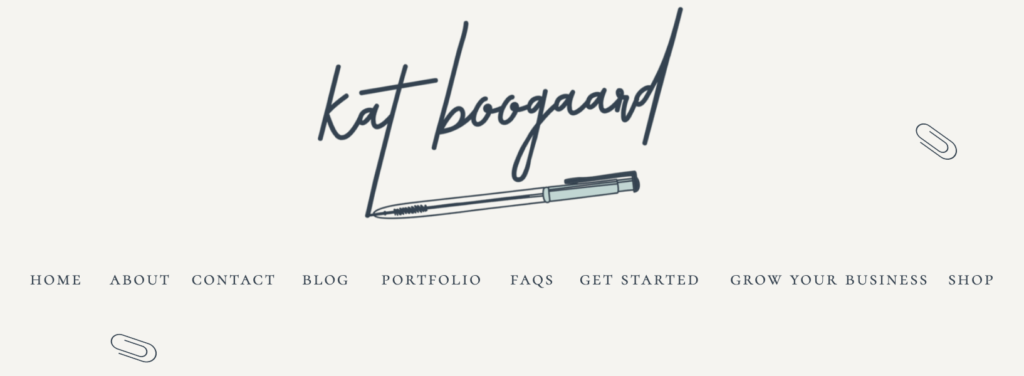
I think it’s also smart to include other calls to action to reach out to you—especially on your home page.
I have this fun “send me a note” section that appears prominently in the footer of my website.
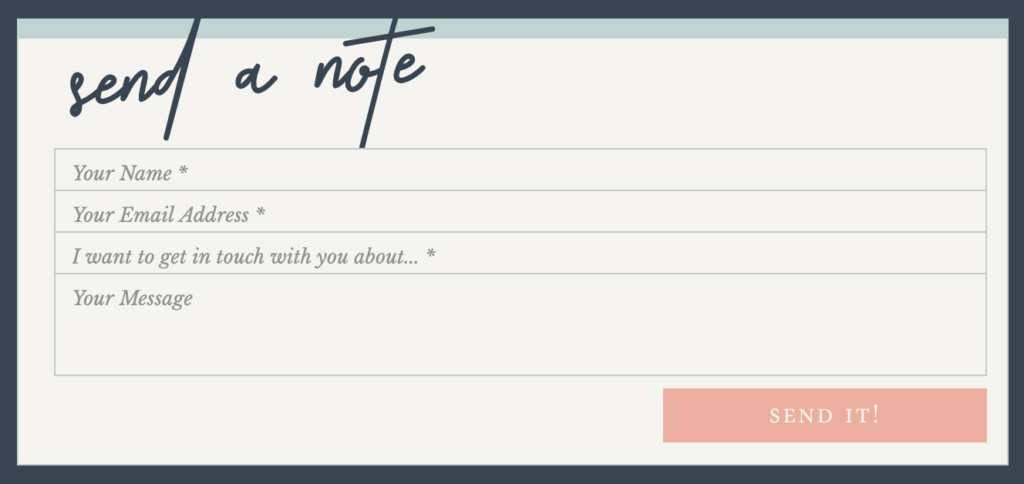
And then this other fun note section on my actual “contact” page:
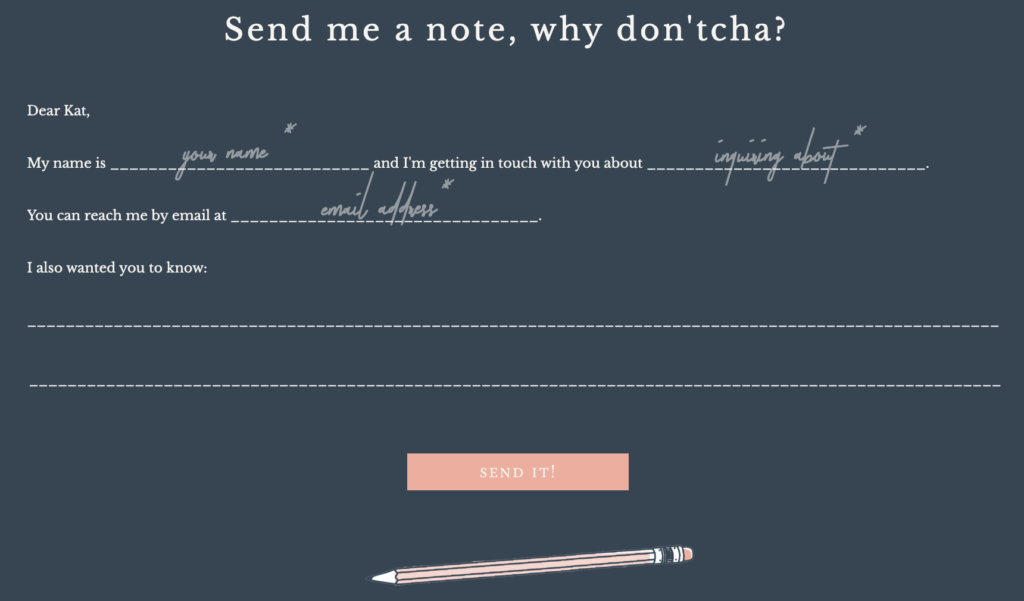
If you feel comfortable listing your phone number or email address directly on your website, go ahead and do so.
I used to have my email listed. But, after getting spammed by PR agencies who wanted me to feature their clients or products, I felt like I had to take it down and switch to these contact forms instead. It’s only when I choose to respond to those inquiries that people get my personal email address.
Do what feels best for you, but just make sure it’s both brainless and painless to get in touch with you.
Oh, and if you do use a contact form, make sure you respond to those messages promptly. I think a lot of people fear that their submissions will float aimlessly in cyberspace.
4. Link to Your Social Accounts
While your website should share a little bit about your personality, it doesn’t hurt to give people who are interested in you some other places they can go to learn more about you—mainly your social accounts.
Whether you’re crazy about Twitter or always posting on Instagram, link to the social accounts that you’re okay promoting publicly.
For example, I never send people I don’t know to my personal Facebook profile (that’s reserved for friends and family), but I’m more than happy to connect on Instagram, LinkedIn, Twitter, Pinterest, or in my Facebook group for freelancers.
Your social media accounts are a great place for people to go and keep up with what you’re doing in real-time. I include links to mine in both the header and footer of my website:

Plus, your social presence can strengthen your brand as a freelancer—particularly if you regularly share content that’s relevant to your niche.
5. Don’t Bite Off More Than You Can Chew
The idea of needing to launch your own freelance writer website can be intimidating. But, I think it’s important to note that it doesn’t need to be anything overly complex—particularly when you’re just getting started.
Personally, my website is built in Showit and I worked with a professional (Rachael Earl Design, if you’re interested) to pull it all together. It wasn’t a cheap or quick process, but it was more than worth it.
However, this is my third website iteration as a freelance writer. Or maybe even my fourth? Or fifth? I’ve lost count.
Don’t make the process tougher than it needs to be in the beginning and start with something simple. Using a platform like Squarespace or a similar solution can help you get up and running with a functional, professional-looking website—without needing to tear your hair out when trying to figure out a bunch of different HTML.
In fact, I recommend starting small. Just get something up that shares who you are and what you do—you can always build from there.
Ready, Set, Go…
It’s tempting to come up with a million different reasons why you don’t need a website to promote your career as a freelance writer (trust me, been there and done that). But, creating a website to showcase your personality and share your best work is a great opportunity to actively market yourself and grow your business.
So, take a deep breath, find a platform that works for you, and just get started. Write a simple “about” page, pull a few portfolio samples, and get it out there. Somethin’ is always better than nothin’.
Your website is one of the basic building blocks you need to get started as a freelance writer. What else do you need? You’ll want a contract, invoice, and project proposal all queued up and ready to go (so you can avoid the last-minute scramble when you need them).
Here’s the good news: I’ve created all of these templates for you in my “Freelance Fundamentals” bundle. Go snag it!
